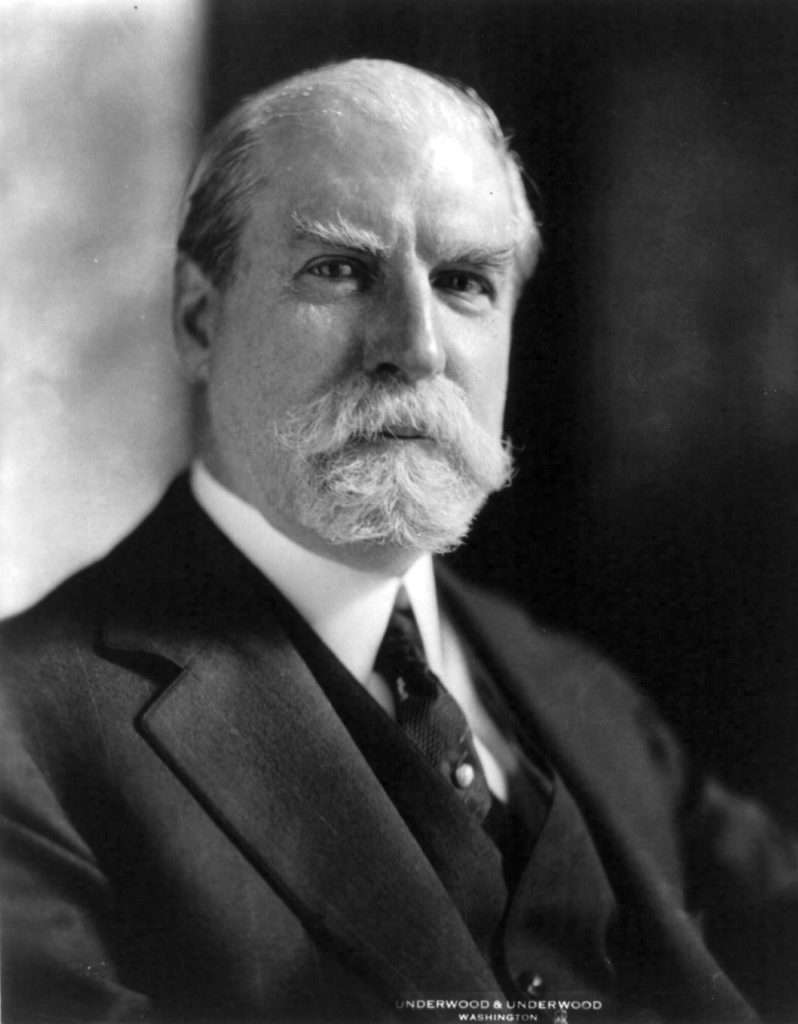The Volokh Conspiracy
Mostly law professors | Sometimes contrarian | Often libertarian | Always independent
Today in Supreme Court History: August 27, 1948
8/27/1948: Chief Justice Charles Evans Hughes dies.

Editor's Note: We invite comments and request that they be civil and on-topic. We do not moderate or assume any responsibility for comments, which are owned by the readers who post them. Comments do not represent the views of Reason.com or Reason Foundation. We reserve the right to delete any comment for any reason at any time. Comments may only be edited within 5 minutes of posting. Report abuses.
Please to post comments


Winner of the Charles Evans Hughes lookalike contest!
He looks like Robert Duvall.
Actually more like our old miniature schnauzer.
Your schnauzer looks like Robert Duvall?
In actual Supreme Court history, a bunch of disbarment decisions on August 27, including:
N. Deday LaRene, 518 U.S. 1046 (1996): criminal defense attorney disbarred after he got in with his gangster clients and was indicted for embezzlement and tax evasion (73 F.3d 64), though that didn't slow him down; see his firm's web site, http://www.lareneandkriger.com, which gives the impression that he's been a member of the Supreme Court bar since 1977
From his profile on lawyers.findlaw.com: "N. C. Deday LaRene was born in New York City on the day of the Allied invasion of occupied France (D-Day), from which he got his name."
I have my doubts. I don't think it was popularly know as D-day at the time, but it wouldn't surprise me if a crooked lawyer would take advantage of a coincidence.
The term was contemporary. On June 6, 1944 the BBC broadcast at noon began: "'D' Day has come. Early this morning, the allies began the assult on the North-Western face of Hitler's European Fortress."
https://www.bbc.co.uk/programmes/articles/10t2SYPhgfG5DLSfb9G8sb/d-day-special-midday-bulletin
I find it interesting that they would say so much. I thought at that time they were still playing the ruse that Normandy was a feint.
Surprised me too. The announcer actually mentions the Caen area as the site of invasion, which it was. I was under the impression that disinformation directed at the Germans continued for several weeks afterward. Hitler kept believing that Normandy was a decoy, the main attack coming at Calais.
Attacking at Normandy the idea of British General Frederick Morgan, who had been planning (at first with an embryo staff) beginning in March 1943. He was frustrated by the tight limits placed on the size of forces he had to plan for and the dithering from above over who was going to be put in charge (Morgan was too junior to lead it himself). For a fascinating read, both as to military planning and clash of military cultures, see his book “Overture to Overlord”.
In the appeals court case cited, a key witness in the case against LaRene was given immunity from prosecution. Despite the grant of immunity he deliberately avoided being served with a subpoena. He was sentenced to a fine and house arrest for contempt of court. The contempt was not disobedience of a subpoena. The contempt was refusing the order to testify that was part of the grant of immunity.
LaRene pleaded guilty and the witness emerged from hiding.
Serving two stints on the Supreme Court from 1910-1916, and then again from 1930-1941, as well as Secretary of State from 1921-1925, he made a mark as both a judge and a statesman. In both capacities, he had an outsized influence in shaping the history of the first half of the 20th century. A towering intellect and a commanding presence, when he resigned as Secretary of State in 1925, Lord Balfour, former British Prime Minister, commented that Hughes was "the most dominant figure I have met in public life." Felix Frankfurter, who as a law professor and public intellectual had been a sharp critic of Chief Justice Hughes, became awestruck of the man when they served together on the Court from 1939 to 1941. Hughes, by then in his late 70s, had lost neither intellect nor command. Frankfurter, himself an intellectual giant, commented that other justices were reticent to speak when Hughes presided over them, such was his commanding presence. Justice Robert Jackson stated that Hughes "was one of the two great personalities of my lifetime. The other was the President [Franklin Roosevelt]."
Still torn asunder by the Taft-Roosevelt split of 1912, the divided Republican party could not agree on a presidential candidate to challenge incumbent Woodrow Wilson in 1916. Very reluctantly, Hughes agreed to step down from the Court to assume the mantle. Six years on the Court had removed Hughes from the rough-and-tumble reality of politics, and he was a poor campaigner, often using the directness and candor of the judge when the dissembling of the political candidate would have served him better. Nevertheless, he lost a relatively close race by an electoral margin by 277-254. Hughes lost California (and its 13 electoral votes) by a margin of less than 3800 votes (.38%); had he won the state, he would have won the presidency. The country, and the world, would have been better served if he had.
How different the world might have been if Hughes won and we were spared a second Wilson term.
The facial hair lives forever!